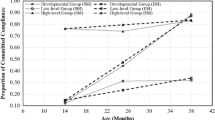Abstract
This research explored the relationship between maternal perception of child temperament characteristics and observations of mother-child interaction in a free play situation. Children were divided into “difficult” and “easy” temperament groups on the basis of their mothers' responses to a temperament questionnaire. Mothers were also interviewed regarding their use of different child rearing techniques. The results indicated that difficult and easy children did not behave differently with their mothers. Mothers, however, did show behavioral differences as a function of their child's temperament classification. In addition, the children's behavior varied as a function of sex and temperament when level of maternal control was considered as a variable. These results suggest that control may be influential in determining whether a mother perceives her child as difficult or easy. The results also suggest that a child's temperament characteristics should not be considered in isolation from his or her sex: that being an easy or difficult child is different depending on whether one is a boy or a girl.
Similar content being viewed by others
References
Thomas A, Chess S, Birch HG:Temperament and behavior disorder in children. New York: New York University Press, 1968.
Billman J, McDevitt SC: Convergence of parent and observer ratings of temperament with observations of peer interaction in nursery school.Child Dev 51: 395–400, 1980.
Maurer R, Cadoret RJ, Cain C: Cluster analysis of childhood temperament data on adoptees.Amer J Orthopsychiat 50: 522–534, 1980.
Thomas H, Chess S:Temperament and development. New York: Brunner/Mazel, 1977.
Cameron JR: Parental treatment, children's temperament, and the risk of childhood behavior problems: 1. Relationships between parental characteristics and changes in children's temperament over time.Amer J Orthopsychiat 47: 568–576, 1977.
Earls F: Temperament characteristics and behavior problems in three-year-old children.J Nerv Ment Dis 169: 367–373, 1981.
Gordon BN: Child temperament and adult behavior: An explanation of “goodness of fit”.Child Psychiat Hum Dev 11: 167–178, 1981.
Scholom A, Zucker RA, Stollak GE: Relating early child adjustment to infant and parent temperament.J Abn Child Psychol 7: 297–308, 1979.
Campbell SBG: Mother-infant interaction as a function of maternal ratings of temperament.Child Psychiat Hum Dev 10: 67–76, 1979.
Milliones J: Relationship between perceived child temperament and maternal behaviors.Child Dev 49: 1255–1257, 1978.
Cameron JR: Parental treatment, children's temperament, and the risk of childhood behavioral problems: 2. Initial temperament, parental attitudes, and the incidence and form of behavioral problems.Amer J Orthopsychiat 48: 140–147, 1978.
Halverson CF, Moss HA, Kearns EJ: Longitudinal antecedents of preschool social behavior. Paper presented at Society for Research in Child Development, New Orleans, La., March, 1977.
Bates JE, Freeland CAB, Lounsbury ML: Measurement of infant difficultness.Child Dev 50: 794–803, 1979.
Dunn J, Kendrick C: Studying temperament and parent-child interaction: Comparison of interview and direct observation.Dev Med Child Neurol 22: 484–496, 1980.
Bates JE: The concept of difficult temperament.Merrill-Palmer Quarterly 26: 300–319, 1980.
Hollingshead AB: Two factor index of social position. Unpublished manuscript, 1957.
Chamberlin RW: A study of an interview method for identifying family authority patterns.Genetic Psychol Monogr 80: 129–148, 1969.
Chamberlin RW: Authoritarian and accommodative childrearing styles: Their relationships with the behavior patterns of two-year-old children and with other variables.J Peds 84: 287–293, 1974.
Vann DM, Kogan KL: Parental perceptions of behaviors in preschool age children: Behaviorally disturbed, developmentally delayed and nonclinical samples.Child Welfare 58: 339–345, 1979.
Wimberger HC, Gregory BS: A behavior checklist for use in child psychiatry clinics.J Amer Acad Child Psychiat 7: 677–688, 1968.
Kogan KL, Gordon BN: Interpersonal behavior constructs: A revised approach to defining dyadic interaction styles.Psychol Reports 36: 835–846, 1975.
Bates JE, Pettit GS, Bayles K: Antecedents of behavior problems at 3 years. Paper presented at Society for Research in Child Development, Boston, April, 1981.
Lee CL: Perceived difficult temperament and mother-toddler interaction sequences. Paper presented at Society for Research in Child Development, Boston, April, 1981.
Lyon ME, Plomin R: The measurement of temperament using parental ratings.J Child Psychol Psychiat 22: 47–53, 1981.
Meyer, JW, Sobieszek BI: Effect of child sex on adult interpretation of its behavior.Dev Psychol 6: 42–48, 1972.
Lambert WE, Yackley A, Hein RN: Child training values of English Canadian and French Canadian parents.Canad J Behavioural Sc 3: 217–236, 1971.
Rothbard MK, Maccoby EE: Parents differential reactions to sons and daughters.J Pers Soc Psychol 4: 237–243, 1966.
Author information
Authors and Affiliations
Additional information
This study is based on a doctoral dissertation submitted to the University of Washington. The author gratefully acknowledges Carolyn S. Schroeder for her critical reading of the manuscript.
Rights and permissions
About this article
Cite this article
Gordon, B.N. Maternal perception of child temperament and observed mother-child interaction. Child Psych Hum Dev 13, 153–167 (1983). https://doi.org/10.1007/BF00705856
Issue Date:
DOI: https://doi.org/10.1007/BF00705856



